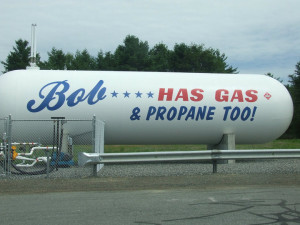FAQ
What are the different size propane tanks and how much propane do they hold?
When we fill a propane tank and the tank is full, the gauge will read 80%. This allows for expansion of the product due to temperature changes. This also will allow space for vaporization to occur.
There are many different sizes and styles of propane tanks. The most common are listed below:
- 20# | 4.4 gal. capacity | Commonly used for BBQ tank
- 30#/40# | 6.6/8.8 gal. capacity | Commonly used for campers
- 100# | 24 gal. capacity | Commonly used for cook stoves
- 200# | 50 gal. capacity | Commonly used for cooking and drying
- 420# | 100 gal. capacity | Commonly used for cooking and drying
- 225/350/500/1000 gallon horizontal tanks | Used for whole house/light commercial heat
What do I do if I smell propane?
Do not turn on or off any switches!! Exit the premises before making a phone call – even a cell phone could produce a spark. Call your propane supplier. You may also call the Fire Department if you feel it necessary. Shut off the gas supply at the tank.
Do you fill Propane Tanks on-site if I bring one to you?
We have an on-site dispensing station that we will refill all of your DOT tanks at if you choose to bring them to us. We will also requalify tanks as needed for a $27.50 charge. Currently, the only tanks that need to be requalified are DOT type cylinders. Requalification is required 12 years from the manufacturing date and every 5 years thereafter. We do have Propane trucks that will deliver product to your tanks at home that are larger than 20# so consider talking with us if you would like to establish an account.
Is there financing available?
Yes! We’ve partnered with the National Energy Improvement Fund (NEIF) to bring you financing for service and installations of most heating systems. Click here to learn more and apply!
Do you offer Gift Certificates?
We do year round! They make very thoughtful gifts for family, friends and neighbors.
How long does an average furnace cleaning take and what is the average cost?
A typical tune-up will take between 1 ½ – 2 hours and range in price between $150.00 – $250.00. These are averages only and other factors should be considered such as length of time between cleanings and additional parts and repairs needed. We recommend a tune-up once a year which helps reduce the chance of your furnace not operating properly in the cold winter months when it is running the most.
I have no heat – Is there anything I can check before I call the office for service?
Make sure there is oil in your oil tank or propane in your propane tank. Check to make sure your Emergency switch is turned on. Check to make sure your breaker is not tripped in your electrical panel. Make sure the service switch on the side of your heating unit is turned on.
Has my Fuel Assistance come in yet?
You will receive a notice from Fuel Assistance when your money is being deposited on account with us. You may also create an account with us online and this will allow you to check your balance at any time. This is a great way to keep up to date with your account! Click here to log on.
Why do I need to pay Minimum and Off-Route Delivery Charges?
In order to keep our prices as low as possible, we need to work as efficiently as possible. Our driver routes are at maximum efficiency when they are able to serve as many customers in one area as possible to limit the wear and tear and fuel costs to reach each house. We strive to deliver between ½ – ¾ of a tank at one time while we are at your location.
What is a whistle on my oil tank and why is it important?
The whistle is an alarm installed in the top of an oil tank. When filling the oil, air travels through the alarm emitting a whistling sound. When oil reaches this alarm tube, air will no longer pass through and the whistling stops. If the delivery driver hears no whistle, he assumes the tank is full and will stop. We do not want to risk over-filling a tank so a properly working whistle is required.
Why does the State of Maine require a Leak Test be done if I run out of propane?
The State of Maine wants to make sure the reason you ran out of propane was not because of a leak in your system. A propane leak can be very serious and potentially cause an explosion. If the delivery driver determines there is no pressure in the tank, a Leak Test will need to be performed. As always, it is better to be safe than sorry!
What do I do if I see a drip or bubble on the bottom of my oil tank?
Do not wipe or touch the spot. If you do, you may wipe off the only thing that is keeping the tank from leaking even worse. Place a bowl or pan under the spot and call us for service as soon as possible.

